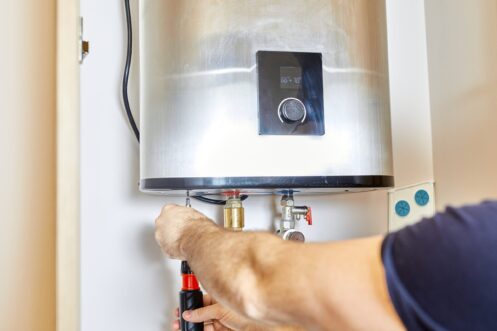
When it comes to choosing a water heater, deciding between traditional tank-style units and modern tankless models can be daunting. You’ve likely heard a lot about tankless water heaters and their energy-saving benefits, but is it really worth making the switch? Tankless water heaters produce hot water on demand, which has some substantial benefits, but they also have their own set of problems.
At Smedley Service in Layton, UT, we’re here to explain the facts so you can make an informed decision that fits your budget and home needs. Let’s examine how tankless water heaters compare to conventional systems, the costs involved, and the benefits they offer.
How Tankless Water Heaters Work
To understand whether a tankless water heater is right for you, it helps to know exactly how it works. Unlike traditional water heaters, which store hot water in a large tank until you need it, tankless models heat water on demand. When you open a hot water tap, cold water flows into the tankless unit, where it’s quickly heated by either an electric element or a gas burner, depending on your setup.
This means that with a tankless water heater, you’re not storing hot water, but instead, you’re heating it as you use it. The advantage of this system is that it doesn’t waste energy keeping a large tank of water hot 24/7, and it can provide hot water continuously as long as you’re not exceeding its maximum flow rate. This on-demand heating system is perfect for homes with moderate to high water usage, but it’s essential to understand how much water your household typically uses to ensure the system will meet your needs.
Pros of Switching to a Tankless Water Heater
The best benefits of tankless water heaters are energy efficiency, space savings, and unlimited hot water. Tankless models are more energy-efficient because they heat water as you need it, rather than keeping a tank of water constantly heated. Traditional water heaters can lose energy through standby heat loss, as the water in your tank cools and needs to be reheated. With a tankless system, you heat the water only when you need it, which can reduce energy waste and, ultimately, lower your monthly utility bills.
Another great benefit is the space savings. A tankless water heater is often significantly smaller than a regular water heater, requiring much less space in your house. This is particularly beneficial if you have limited space in your utility room, garage, or basement. Tankless water heaters may be mounted on a wall or in a tiny closet, providing you with extra usable space.
One of the best things about a tankless water heater installation is the promise of never running out of hot water. As long as the system is up to the task, you can enjoy hot showers or run multiple appliances without worrying about the water running cold. You can take long showers or run multiple appliances simultaneously without running out of hot water.
Cons of Switching to a Tankless Water Heater
Despite the many benefits, there are some downsides to consider when thinking about making the switch. One of the most significant disadvantages of a tankless water heater is its up-front cost. Tankless models are more expensive compared to traditional tank water heaters, both in terms of the unit itself and the installation. Installation can be more complex, especially if you’re switching from a traditional system, which may require upgrading your gas line, electrical system, or venting.
Another challenge with tankless water heaters is that their capacity may only be suitable for some homes. Tankless units are designed to provide a constant flow of hot water, but there’s a limit to how much hot water they can deliver at once. If your household has high hot water demands — say, multiple showers, a washing machine, and a dishwasher running simultaneously — you may need larger or multiple units to meet your needs. This can make tankless systems less suitable for large families or homes with high simultaneous water usage.
Additionally, tankless water heaters have a slower flow rate than typical types, so hot water may take a few seconds longer to reach your faucet. While this delay isn’t normally a big deal, it’s something to keep in mind if you need hot water right away.
How Long Will a Tankless Water Heater Last?
When considering any appliance, the lifespan of your new unit is an important factor to consider. Tankless water heaters are typically recognized for their long lifespan. On average, a tankless water heater can last 15 to 20 years — longer than traditional tank models, which typically last 10 to 15 years. Since there’s no tank that can corrode over time, a tankless unit can last longer with proper maintenance.
Routine maintenance is necessary by a professional plumber to keep the tankless water heater operating smoothly, especially in areas with hard water. Hard water can lead to mineral buildup, which can affect the performance and efficiency of your system. Flushing the unit annually and descaling it can help prevent these issues, extending the lifespan of the unit. Installing a water softener may also be beneficial.
Household Size Is an Important Consideration
Whether you live in a small household or a large one, a tankless water heater can be a great option — but it’s important to understand how your household size and water usage will impact its performance.
For smaller households with one or two people, a tankless water heater can be an ideal choice. With modest hot water needs, like a single bathroom, limited appliance use, and less simultaneous water demand, these systems work efficiently without the risk of running out of hot water. The space-saving benefit is a huge plus in smaller homes or apartments, where every square foot counts. Additionally, the energy savings are more noticeable in small households, as the system heats water only when it’s needed, rather than maintaining a full tank of hot water 24/7.
On the other hand, larger households with multiple bathrooms, laundry rooms, or high water usage may need to consider more factors before switching to a tankless water heater. These systems can still work, but they may need more hot water appliances to meet the demand.
In these cases, more than a single tankless water heater may be required, and you may need to install multiple units or opt for a larger, high-capacity model designed to handle higher demand. While it’s possible to make a tankless system work for a larger household, it’s important to factor in the added costs and potential installation challenges, such as the need for additional units or upgraded gas lines.
Ultimately, the decision should come down to your household’s specific hot water usage. For small to medium households, a tankless water heater can provide energy efficiency, endless hot water, and space-saving benefits. For larger homes, additional considerations around capacity and cost come into play, but with the right setup, tankless heaters can still be a solid investment.
Schedule Your Installation Today
Switching to a tankless water heater can be a great investment if you’re looking to save space and reduce energy costs in the long run. However, you’ll need to weigh the up-front cost against the potential savings along with your home’s hot water demands.
At Smedley Service, we can help you determine the best water heating solution for your home and guide you through the installation process, whether it’s a tank-style water heater installation or a tankless model. We also offer furnaces, boilers, heat pumps, HVAC, drain cleaning, leak detection, and pipe installation services.
Call Smedley Service today to learn more or schedule an appointment with our team.




